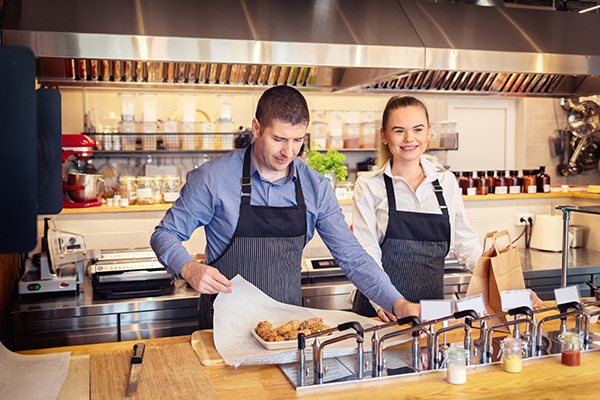Green Your Take-Out with Compostable Foodservice Ware

As the pandemic continues, sustainable practices must also continue and expand to meet our world's environmental challenges. More people than ever are ordering take-out food. Sustainable foodservice ware can help "green" your business while creating positive environmental change with your to-go offers. There are many reasons to make the switch to compostable containers and create a premium experience that also benefits the planet. Some studies have shown that up to three-quarters of those surveyed are willing to pay more for single-use items that had environmental materials and end-of-life attributes, including: those made with renewable materials (particularly plant-based) and compostable materials. Many consumers today also prefer brands that make sustainable business efforts over those that do not.
Expanded polystyrene (often called StyrofoamTM), commonly used by restaurants and food service businesses, has demonstrated a significant negative impact on our planet and wildlife, at both the local and global level. Its composition includes a known carcinogen chemical called styrene, which has the potential to migrate into foods and the environment. Expanded polystyrene is also difficult to recycle due to its high volume and low weight. This lightness frequently causes it to escape waste management and end up as litter. This has propelled many to ban it, including states such as Maryland, Maine, and New York, along with hundreds of other municipalities.
Although recycling plastic single-use foodservice ware seems like an option, it is most likely not recyclable if the product is contaminated with food residue. Cutlery presents a unique issue due to the size and variety of plastic materials, while traditional tree-fiber paper cups with plastic linings are not recyclable. Recycling also continues to be a challenge due to China's ban on subpar materials. Even before that ban, only 9% of the world's plastic was recycled. These factors are just a part of the difficulty in recycling foodservice products. Despite being generally priced at a premium in comparison to expanded polystyrene, compostable products provide a promising alternative.
As the recycling market continues to present challenges and relies on national and global markets, composting presents a localized way to create a circular economy. Commercial composting facilities can sometimes take compostable foodservice ware with food waste; ask your local waste hauler about this possibility. Composting bypasses the need for international shipping of waste products that contribute to the carbon footprint of recycling. Furthermore, food is not a contaminant for compostable products. More food is diverted from the landfill when compostable products are accepted. When food waste is landfilled, it creates methane, a powerful greenhouse gas that is as much as 25 times more potent than carbon dioxide.
Traditional tree-fiber products, such as coffee cups and soup containers, are usually lined with a petroleum-based lining, making them non-compostable and challenging to recycle. Compostable alternatives use bioplastic such as PLA as a lining to allow the whole cup or bowl to be composted. These must use bio-based plastic linings to decompose back into carbon dioxide, water, and biomass when composted in commercial composting systems. Compostable paper foodservice ware can be made with alternative papers, such as those made from rapidly renewable fibers like bamboo and sugarcane, and are gaining traction. Sustainably harvested paper with bio-plastic linings are also an option (check for Forest Stewardship Council or Sustainable Forestry Initiative logos).
Cutlery made from molded fiber and compostable plastics derived from corn, tapioca starches, and lactic acid is alternatives to traditional plastic utensils, often unable to be recycled. Fiber cutlery has recently been introduced on the market. Wood utensils are also an option.
These compostable products help divert food waste from the landfill with how easy it is to compost them with food waste. Consumers can add them, food waste included, to their residential composting pick-up (if accepted by the commercial composter) or at the restaurant. Since food waste in the landfill creates methane, a potent greenhouse gas, this diversion is essential for climate change.
Material science in the compostable product category has advanced considerably since its inception to the mass market in the last two decades. While compostable products disintegrate in commercial composting, they keep food fresh from the restaurant to the home. Innovation in packaging has also driven a new era of durable, soak, and leak-proof options and keep food intact. Plastic packaging is unable to breathe, trapping steam to cause food to get soggy. Yet, many eco-friendly fibers keep food items crispy and fresh.
Small and mid-sized restaurants are widely perceived as more capable of incorporating sustainable disposable products. However, dozens of large foodservice and restaurant companies have proven it is possible at scale and across multiple locations. Many sustainable product manufacturers can meet high demand and volume today. Corporate branding and other personalization are also possible as with traditional products. While the price is occasionally a barrier, many operators are willing to pay a modest premium to offer their patrons a more sustainable option, especially if it enables both food and packaging waste to be composted.
It is essential to understand that not all "eco-friendly" looking products are indeed compostable. Composability requires the item to biodegrade and disintegrate according to scientific test standards of ASTM D6400 or D6868, depending on the product. These tests are verified by certification bodies that ensure the product meets standards for composting, toxic chemicals, and does not use petrochemicals. Copy-cat like items includes kraft paper boxes with petroleum plastic linings or cutlery with some bioplastic and some petroleum plastic. As restaurants and food services seek compostable ware, they must be sure to ask for certifications, including Biodegradable Products Institute (BPI), TÜV Austria OK Compost Industrial, or Compost Manufacturing Alliance. These eco-labels ensure that it is a product made of materials that will compost in a commercial composting facility.
Restaurants and food services can also implement other measures to help with greening their packaging practices. One simple action is to ask customers if they need cutlery, napkins, and sauces to avoid extra waste, as well as if they prefer the order be bagged. Employees and staff can also be trained to provide these items at a minimum that corresponds with the order size. Some restaurants are experimenting with reusable containers for take-out food that customers can bring back for a deposit. Overall, making an effort to incorporate green practices into the to-go experience shows customers that you care about the environment and offer them a premium take-out dining experience.
 Lauren Olson is the Zero Waste Manager for World Centric, she has experience in consulting, training, marketing, and product design. She is a seasoned program developer and facilitator, implementing research and education by involving organizations and communities to create sustainable solutions and long term initiatives. Lauren is interested in waste, consumerism, circular economy, hazardous chemical management, cradle-to-cradle design, life cycle analysis, behavioral psychology, and scientific research. Lauren holds a Master's degree in Community Sustainability specializing in decision-making about waste, and a Bachelor of Science's degree in Environmental Economics and Policy with a specialization in Environmental Studies and Applications-- both degrees from Michigan State University. In addition to her distinguished career, she also has a hobby business creating new clothing from old t-shirts called Remark Clothing.
Lauren Olson is the Zero Waste Manager for World Centric, she has experience in consulting, training, marketing, and product design. She is a seasoned program developer and facilitator, implementing research and education by involving organizations and communities to create sustainable solutions and long term initiatives. Lauren is interested in waste, consumerism, circular economy, hazardous chemical management, cradle-to-cradle design, life cycle analysis, behavioral psychology, and scientific research. Lauren holds a Master's degree in Community Sustainability specializing in decision-making about waste, and a Bachelor of Science's degree in Environmental Economics and Policy with a specialization in Environmental Studies and Applications-- both degrees from Michigan State University. In addition to her distinguished career, she also has a hobby business creating new clothing from old t-shirts called Remark Clothing.